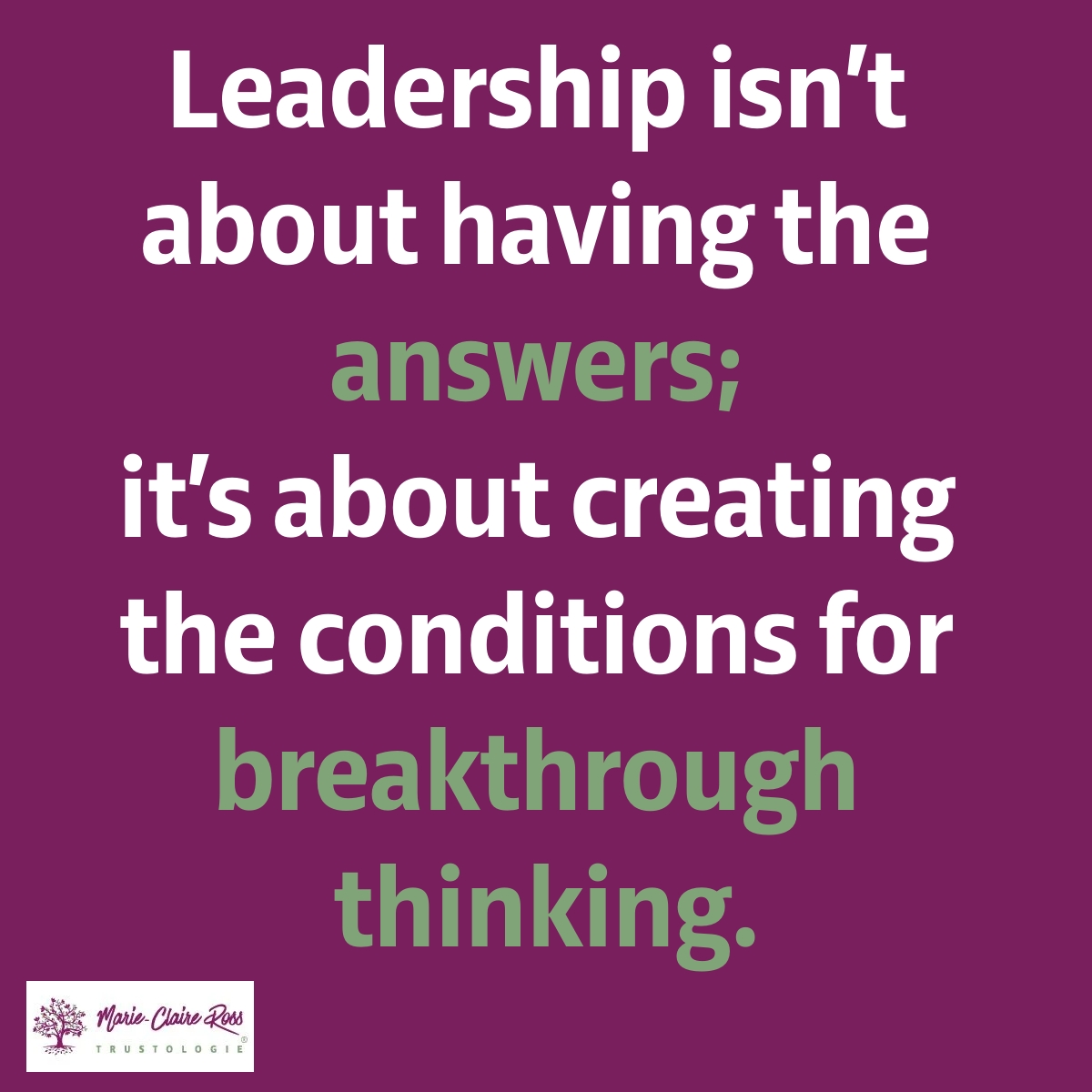8 min read
Beyond the "Why": 5 Coaching Secrets to Unlock Curiosity in Leadership
When my daughter was 17 months old, she discovered a superpower: the word “Why?”For the next two years, it was her response to almost everything.
Develop leaders, strengthen executive teams and gain deep insights with assessments designed to accelerate trust and performance.

Transform how your leaders think and perform with keynotes that spark connection, trust and high-performance cultures.

Explore practical tools, thought-leadership and resources to help you build trusted, high-performing teams.

Trustologie® is a leadership development consultancy founded by Marie-Claire Ross, specialising in helping executives and managers build high-trust, high-performing teams.

6 min read
Marie-Claire Ross : Updated on November 25, 2015

 Our language is incredibly powerful. How we talk about ourselves, and others, says a lot about about us.
Our language is incredibly powerful. How we talk about ourselves, and others, says a lot about about us.
In the book, Tribal Leadership by Dave Logan, he discusses that tribes emerge from the language people use to describe themselves, their jobs and others in the work team. When you change the language in your tribe, then you change the tribe yourself.
This is incredibly important for any current, or aspiring business leader, to understand. As it means, that if you want to encourage your business team to change or shoot for a new goal, then you need to know the right language to use.
Depending upon the size of a company, there can be multiple amounts of tribes who are all operating at different levels. As Malcolm Gladwell, says in the book, The Tipping Point, tribes are groups of between 20 - 150 people. Once you get to 150 people, the group splits into two. The figure of 150 seems to represent the maximum number of individuals with whom we can have a genuine social relationship, the kind of relationship that goes with knowing who they are and how they relate to us.
Interestingly, how these tribes operate and the amount of success they will experience can be determined by their language. Back to the phenomenal book, Tribal Leadership again, they believe workplaces have a variety of tribes that can be broken down into five groups:
Stage 1 (2% of workplaces) - This is when people have despairing hostility and anger. It is the mindset that creates bikie gangs and when people go to work with guns. The common language is "life sucks".
Stage 2 (25% of workplaces) - This is where people are "apathetic victims". They tend to be sarcastic, cynical and have no ability to innovate. Team building doesn't work. Their common language is "my life sucks".
Stage 3 (49% of workplaces) - This is where knowledge is power, so people hoard information. Winning is personal and there is a strong desire, and need, to be better than others. Common in sales, academia and where success is measured on an individual performance basis. The common language is "I'm great (and you're not)".
Stage 4 (22% of workplaces) - This is where good things start to happen and you develop high performing workplaces. People enjoy working with each other and if you take the tribe away you remove a tribe member's sense of self. The common language here is "we're great".
Stage 5 (less than 2% of workplaces) - This is where magic happens, it's about infinite potential and how the tribe is going to make history. It's not about beating others or a competitor, it's about making global impact. The common language is "life is great". Few companies stay in this space for long and tend to fall back into Stage 4. It's common in companies working manically towards a new drug or technology. For example, when the Macintosh was being created or the first Pixar movie, "Toy Story".
Jim Stengel wrote in Grow, about his experience of how he changed different departments while he worked at Proctor & Gamble, by encouraging employees to work towards a brand ideal of improving people's lives. This is operating at a Stage 5 leader. He wasn't the CEO, but departments (150 people of less) can operate at this level, even if the rest of the company does not.
The important take out from this is that most companies have a mixture of people operating in Stages 2, 3 and 4. Most people will be based in the Stage 2 (where "my life sucks") and Stage 3 ("I'm great").
The trick is when you're writing a workplace safety speech, or any company speech, is to use language that motivates people in Stages 2-4.
Here is a list of 5 power words or themes for workplace speeches that is motivating to people at all levels:
1. We - This seems quite basic, but it really separates Stage 3 and 4+ leaders. Remember, Stage 3 leaders operate from being the best, so everything is about them. Whereas, Stage 4 leaders operate from "we". Ironically, by dropping the focus on yourself, you become stronger. Great leaders put the institution and the people in it, before themselves. This means saying "We are going to improve etc", rather than "I want for XYZ company that we improve our ratios" or "I believe we can do this". A great example is a current political ad, that I see on the way to work for the Family First Party in Australia (excuse the photo being blurry, but it was taken in a moving car, not by the driver). It has a picture of a woman saying "I'm putting my Family First".

This is classic Stage 3 mentality. If her family were that important to her, we'd see them and she'd say "Our Family Comes First". When employees complain about their CEO giving inauthentic speeches that don't ring true, what they are picking up on is the hidden "I" language that is masquerading as "we", which is really all about the CEO and not the company and employees.
2. Global Impact - If you want to focus people on moving up the stages, then you need to focus on your global impact. As tribe members, we all want to be part of something bigger than ourselves. Articulate an ideal that focuses on fundamental human values and that includes your company heritage or DNA. As Jim Stengel, says in Grow, companies that operate at global impact level include Red Bull "to uplift mind and body; it exists to energise the world" and Zappos "delivering happiness". Tie in other operational goals (including safety) into your global impact statement.
3. Collaboration - To get people out of operating at lower levels, you've got to get them working together. As the leader, your speech needs to focus on collaboration and you need to be an exemplary role model for this type of behaviour. Ideal-inspired collaboration always trumps "command and control", or rule by fear and manipulation. I used to have a CEO who would talk endlessly about teamwork, but would only work one on one with people. She would also say "My door is always open, even if it is closed". But this was no metaphor, it was always closed. We all knew we could never just ask her any questions (if you did knock on her door, she'd give you a death look when you opened it). To be authentic, you must talk about collaboration and your must collaborate. Great leaders encourage friendships and will introduce new people to others and get them to work together. Remember, friendships are crucial to a good culture and are the basis for high staff engagement levels. Get people to understand that the task at hand is bigger than what one person can do alone and it requires everyone's best efforts and passions (this is important for Stage 3 people to hear, who prefer to work alone and say no-one is talented enough to help them).
4. Because - Remember, when you were a kid, a relevant end to an argument in the playground was "Just because"? In fact, when my kids have asked questions that were too hard for me to answer (okay, I was just exhausted from endless questions), I admit I've chickened out and retorted "because" and that was considered an effective response. The thing is - adults are the same! In the book, Influence: The Psychology of Persuasion by Robert Cialdini, he discussed a social psychology research study that found that one of the principles with human behaviour is that if we ask someone to do us a favour, we will be more successful if we provide a reason. The magic word that made all the difference was - because. A research study found that saying "Excuse me, I have five pages. May I use the Xerox machine because I'm in rush" had 94% effectiveness versus "Excuse me, I have five pages. May I use the Xerox machine?" which was only effective 60% of the time. Further testing showed it was actually the word "because" that made all the difference. In fact, it didn't really matter how good the excuse was, as long as it came after the word "because". The word "because" triggers an automatic compliance response. As a leader, include "because" whenever you need to ask people to do something - whether that means thinking differently or undertaking tasks in a new manner. For example, "We need to aim for zero injuries because this means we have a safe workplace".
5. Leverage company values - Company projects and processes are all fuelled by values that must all be aligned to a noble cause (or global impact). Stage 3 leaders plaster corporate values everywhere, but do not live and breathe them. That's why Stage 2 employees are cynical about them. And they have good reason to be. Stage 4 leaders tell value-laden stories and metaphors that trigger others to tell similar stories about values. All decisions they make are based on company values from hiring, firing and training. Include company values in your speeches (written in a story format) - no exceptions. See How Corporate Story-Telling Improves Corporate Performance for more information.
As a leader, it's important to understand that employees will form into tribes and the dominant cultural stage will determine your organisation's effectiveness.
Highly effective leaders are Stage 4 leaders and use the right language that influences people at all cultural stages (rather than divides). But not everyone has the skills of a Stage 4 leader. That's why we've created supervisor training to provide connect and collaborate skills, so evident of Stage 4 leadership. You can find out more at 9 Creative Communication Techniques for Toolbox Talks.
Include these power themes in your everyday workday speeches and you'll be surprised at the results.

8 min read
When my daughter was 17 months old, she discovered a superpower: the word “Why?”For the next two years, it was her response to almost everything.

11 min read
I have a friend who often finds herself at the mercy of her emotions. Recently, she called me to rehash a confrontation she’d had with a group of...

9 min read
True leadership presence isn’t a performance or a set of charisma hacks; it is the felt experience of who you are being in the room. By cultivating...

Today, most leaders theoretically understand the importance of honest, open discussions, so that that potential issues are flagged and important...

Cast your mind back to when you last had a face-to-face meeting in your leadership or management team. What did you talk about? Typically, most...

When it comes to safety, no company wants to see staff hurt or property damaged.